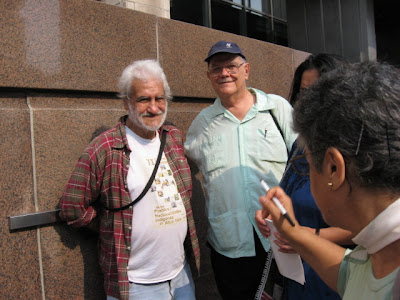Martin Luther King Jr in the age of Obama: Why we can't wait

By Billy Wharton
January 17, 2010 -- Albert Boutwell's election as Birmingham, Alabama, mayor in 1963 might have signaled the end of the modern civil rights movement. As a moderate Democrat, Boutwell promised to temper the harsh repression unleashed by the city’s notorious chief of police and his mayoral opponent Eugene “Bull” Connor. Mainstream leaders of the black community were told to wait it out –- let the storm pass and incremental changes could begin. Dr Martin Luther King Jr. refused to wait. Instead, he launched Plan “C” (confrontation), a large-scale protest campaign that broke the back of Southern segregation.
Haitians plead: `Where is the help?'
January 15, 2010 -- Evidence of monstrous neglect of the Haitian people is mounting following the catastrophic earthquake three days ago. As life-saving medical supplies, food, water purification chemicals and vehicles pile up at the airport in Port-au-Prince, and as news networks report a massive international effort to deliver emergency aid, the people in the shattered city are wondering when they will see help.
United States: Blacks still taking the hit
January 2010 -- Against The Current -- It took 10 months before the US Congressional Black Caucus (CBC) stood up and challenged President Barack Obama. In a surprise move, 10 CBC leaders refused to participate in a key House of Representatives financial committee vote in December 2010 until some more relief is provided to Black businesses.
Black politicians and civil rights leaders have been understandably careful about criticising the first Black president. Yet facts on the ground, especially the super high unemployment in the Black communities, forced their hand. While their challenge is mild, it is significant.
The impact of the Great Recession has been greatest on Blacks as well as on other ethnic minorities. Official unemployment is nearly 50% higher for African Americans than for whites. What’s most striking is that the Black middle class, including those with Ivy League educations, are having a hard time finding jobs.
The issue of “race” once again is becoming a hot topic in the Black community as qualified professionals and skilled workers with equal or better résumés than whites are being turned down for jobs — going instead to whites with lesser qualifications. It is a reminder of the pre-civil rights era.
Fidel Castro: The lesson of Haiti

By Fidel Castro Ruz
January 14, 2010 -- Two days ago [January 12], at almost six o’clock in the evening Cuban time and when, given its geographical location, night had already fallen in Haiti, television stations began to broadcast the news that a violent earthquake -– measuring 7.3 on the Richter scale -– had severely struck Port-au-Prince. The seismic phenomenon originated from a tectonic fault located in the sea just 15 kilometres from the Haitian capital, a city where 80% of the population inhabit fragile homes built of adobe and mud.
The news continued almost without interruption for hours. There was no footage, but it was confirmed that many public buildings, hospitals, schools and more solidly constructed facilities were reported collapsed. I have read that an earthquake of the magnitude of 7.3 is equivalent to the energy released by an explosion of 400,000 tons of TNT.
Tragic descriptions were transmitted. Wounded people in the streets were crying out for medical help, surrounded by ruins under which their relatives were buried. No one, however, was able to broadcast a single image for several hours.
The 350 ppm carbon dioxide challenge and how to achieve it

By Renfrey Clarke
January 14, 2010 -- The target posed by leading NASA climate scientist James Hansen of stabilising atmospheric carbon dioxide at 350 parts per million (ppm) is increasingly understood in conjunction with the need to keep cumulative emissions within a tight global “budget”. While the point at which budgeted emissions occur is not in theory crucial, in practice there is a need to ensure that emissions peak early and decline swiftly thereafter.
The West’s role in Haiti's plight
By Peter Hallward
[An earlier version of this article first appeared in the British Guardian. This slightly updated version appears in Links International Journal of Socialist Renewal with Peter Hallward's permission.]
January 14, 2010 -- If we are serious about assisting this devastated land we must stop trying to control and exploit it.
2010: Welcome to the upside-down world of South Africa

By Dale T. McKinley
January 11, 2010 -- SACIS -- Even if the meanings we give to measurements of time are most often overblown, there is something about the mark of a new decade. In the case of South Africa, 1990 marked the beginning of the end of the apartheid system, ushering in a period pregnant with new hopes, possibilities and dreams. When 2000 rolled around it heralded not only a once in a lifetime turn of a century but carried with it the delayed weight of the majority expectation of an age of progress and plenty. So what are our "inheritances" as we begin the new decade? Where do things stand? What is the mark of 2010?
Daniel Bensaïd: militant, intellectual, friend

By François Sabado
International Viewpoint -- Daniel Bensaïd left us today, Tuesday, January 12, 2010. Born in 1946 he gave his life to the cause of defending revolutionary Marxist ideas right to the end. He was one of the founders of the Jeunesse Communiste Révolutionnaire (JCR -- Revolutionary Communist Youth) and the Ligue Communiste Révolutionnaire (LCR -- Revolutionary Communist League, French section of the Fourth International).
A leader of the May '68 movement, he was one of those people with a very sure feeling for political initiative. He had been one of the leaders of the 22nd March Movement. Grasping the dynamic of social movements, in particular the link between the student movement and workers’ general strike, he was also one of those who understood the necessity of building a political organisation, of accumulating the forces for building a revolutionary party.
The quality of Daniel’s intelligence was to combine theory and practice, intuition and political understanding, ideas and organisation. He could, at the same time, lead a stewarding force and write a theoretical text.

Hugo Blanco (left).
By Hugo Blanco, translated by Richard Fidler for Links International Journal of Socialist Renewal
The concentration of greenhouse gases (GHGs) in the atmosphere is already so high that the climate system has been brought out of balance. The CO2 concentration and global temperatures have increased more rapidly in the last 50 years than ever before on Earth, and will rise even faster in the coming decades. This adds to a multitude of other serious ecological imbalances, the impacts of which threaten the lives and livelihoods of the people of the world, most acutely, impoverished people and other vulnerable groups.
Britain: Building left unity out of the wreckage

The Socialist Resistance national committee adopted this document, by Liam Mac Uaid, on January 9, 2010, to outline its balance sheet of the last decade’s attempts at the resolving the crisis of working-class representation in Britain.
* * *
January 9, 2010 -- Socialist Resistance -- The workers’ movement in Britain has faced a crisis of working-class representation since the rise of New Labour in the mid-1990s and it has been becoming more acute ever since. This backdrop put left unity at the centre of the political agenda. The rise of the Scottish Socialist Party (SSP) and the Socialist Alliance (SA) were the first organisational expressions of this necessary process. A critical look at the last decade is essential if we are not to make the same mistakes – those who do not learn from history are pretty likely to make the same ones all over again.


